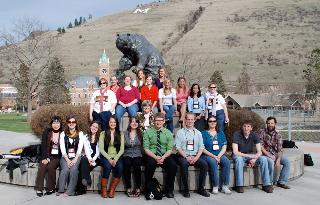More than $30,000 awarded in honors grants
Summer and fall undergraduate research applications reached a high this year, with 24 applicants turning in potential research projects.
“The summer competition was very competitive for summer grants,” said Bonnie Irwin, dean of the Honors College.
People apply and their professors write letters of support. A committee then reviews all the proposals.
This year, there were 24 applicants for summer and fall, which is the highest number that the honors college has seen so far.
Out of those, eight were chosen and awarded money to conduct their research by the council on undergraduate research, scholarship and creative activity.
“Most are a single student, but sometimes the student will work with more than one faculty member,” Irwin said.
The student gets $3,000 to conduct their research over the summer, some of which will be done abroad.
The professors who work with the students get $500.
“Depending on the project, some present their research at a conference and some get it published,” Irwin said.
The truth about Columbus
Maegan Walsh, a senior elementary education major with a math concentration, will do her research on Christopher Columbus.
“I was in social studies and (our professor) had us chose a historical event (to write on) with 10 primary sources and two secondary sources,” she said. “I wasn’t looking forward to it at first. He suggested Christopher Columbus and I ended up really enjoying it.”
Walsh did her initial project on how Columbus was a rapist and a thief.
“I was not taught these things (as a child),” she said. “I hope this broadens horizons in teaching a little bit.”
Walsh started this project this semester and did not know a lot when she first started researching.
“I learned that they didn’t treat the Indians well at all,” she said. “Columbus said they were kind, gentle people but they should be slaves.”
Walsh created a unit plan to make the research kid-friendly and to allow children to find out about Columbus through primary sources.
“I think it’s important for kids to find things out on their own,” she said.
Certain things could be excluded when teaching children, such as how the Indians were raped.
Walsh also dislikes how children are taught that Columbus discovered America.
“We were already there,” she said.
She also mentioned a book she read on the topic, “A Short Account of the Destruction of the Indies” by Bartolome de Las Casas about destructive things that were done by the Spaniards.
John Bickford III, assistant professor in the early childhood elementary middle level education, was the professor involved with Walsh’s study.
“(Columbus) was a terrible person and in class, I brought in documents on Columbus,” Bickford said. “Maegan got really interested and started studying on her own. It was her idea to look at the history upon which teaching tools are based.”
The study will also look at what teachers know and how they teach this.
“People like their historical figures to be very simple and it’s the same way with Columbus,” Bickford said. “They like to pigeonhole people – there’s a lot more to the story.
Student studies caffeine effect on rats
Daniel Cassidy, a senior biology/pre-med major, has been studying the effects of caffeine on newborn rats for two years.
This study is in conjunction with research another student is conducting on the effects of caffeine on a rat’s respiratory system and the two studies were compared.
“Obviously, we found caffeine produces a higher heart rate,” he said.
This year, Cassidy will study the effects of the drug Dipropylcyclopentylxanthine, commonly know as DPCPX, on newborn rats, which will also be studied by another student in the respiratory system and the results of this study are still pending.
“I’m interested in medicine and pharmacology,” Cassidy said. “I’m planning to be a doctor and that’s why I’m interested in the research.”
Cassidy received $500 last year to do the caffeine studies and is receiving $3,000 this year to do continuing studies with DPCPX.
Kip McGilliard, an associate professor in biological sciences, worked with Cassidy.
“My lab has been studying respiration in newborn rats for many years and we were interested in expanding to look at heart rate,” McGilliard said. “There was not a good technique previously for studying newborn rats the size of your finger.”
Cassidy got the smallest electrodes he could find and placed them on the chest of a newborn rat, less than a week old, with a harness, which allowed him to record electrocardiograms, or heart rates, of the rats.
NCUR Conference
This weekend, a number of students who received grants last year went to the National Conference on Undergraduate Research (NCUR) at the University of Montana.
This is the second year Eastern has participated at the conference.
“It’s nice for students to present research somewhere else besides Eastern’s campus,” Irwin said.
Heather Holm can be reached at 581-7942 or haholm@eiu.edu.
More than $30,000 awarded in honors grants

Eastern’s Honors College funds undergraduate research for summer and fall semesters. This year, 24 applicants applied for funding through the college.(Photo submitted by Bonnie Irwin)

















![[Thumbnail Edition] Senior Foward Macy McGlone, getsw the ball and gets the point during the first half of the game aginst Western Illinois University,, Eastern Illinois University Lost to Western Illinois University Thursday March 6 20205, 78-75 EIU lost making it the end of their season](https://www.dailyeasternnews.com/wp-content/uploads/2025/03/WBB_OVC_03_O-1-e1743361637111-1200x614.jpg)




















































